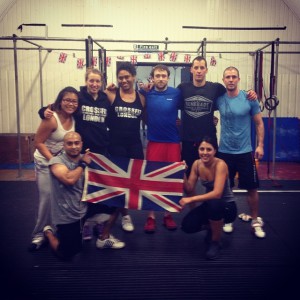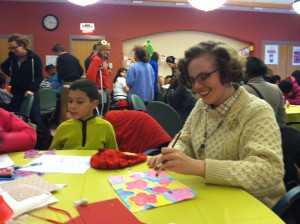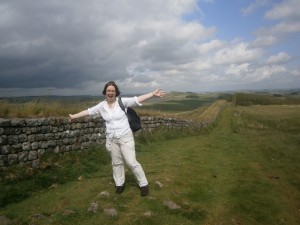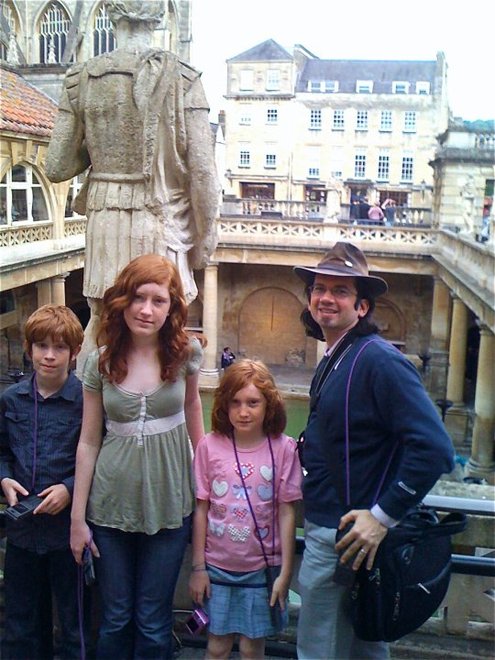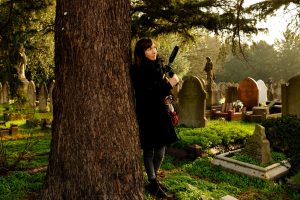
Katie Thornton recording for her Fulbright podcast in a cemetery in the United Kingdom.
One connection at a time, Fulbright brings people closer together and moves nations closer to a more peaceful world. What better way to build connections at home and abroad than through creatively telling your Fulbright story?
To get your project started, we’ve asked Katie Thornton, an award-winning multimedia journalist and Fulbright-National Geographic Storyteller, to provide tips on crafting the perfect storytelling project through audio, visual, or written formats.
Katie, who finds the most thought-provoking stories in the least expected places, most recently authored A Brief History of Women in Bars: A Minnesota Story in Three Rounds, an audio document that looks at how the state’s temperance movement set the stage for its women’s suffrage movement. For her Fulbright-National Geographic Storytelling Fellowship, Katie traveled to the United Kingdom and Singapore to produce Death in the Digital Age, a podcast exploring the relevance of cemeteries in an era when land is strained, communities are physically distant, and digital documentation is pervasive.
We hope Katie’s insights help you produce the perfect Fulbright reflection.
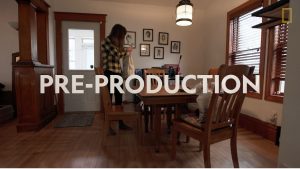
1. The most important thing is to just start.
Starting a creative project can be intimidating, but perhaps the hardest part is getting started. The most important thing you can do is to begin–to take your idea and give it life.
Ask yourself: what skills and knowledge do I need to gain before I can turn this idea into a reality? Do I need to educate yourself on a topic? Learn how to edit audio? Make a list, and start checking things off.
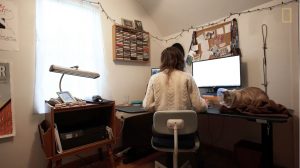
Katie Thornton works at her home studio on podcast projects.
2. Use online tutorials to help get the best quality product.
One of the reasons I care so much about audio is because it is an accessible medium–both to produce and to consume. At one point during my Fulbright, I didn’t have access to a studio, and I recorded an NPR story under a sheet in my bedroom. My home “studio” is my closet.
There are tons of ways to use the materials and devices you already have–like pillows, blankets, and your phone–to get good quality audio. There are also a lot of great free and cheap editing programs. Turn to the internet for tips!
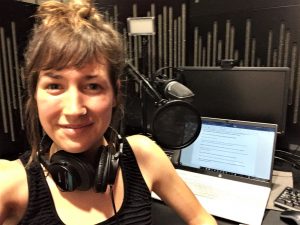
Katie Thornton recording in the studio.
3. Listen, gather, and compile.
Listen carefully to the sounds around you, and to a variety of podcasts and audio media. How do different podcasts bring in music and ambient sounds (like cars honking, leaves crunching, birds chirping, people chanting, etc.) to set the scene?
Start recording the sounds that define your daily life and surroundings. Record your thoughts throughout the day, and try putting together a brief audio diary that describes it. Ask a friend or two to do the same, share your pieces, and have a Zoom chat about your audio diaries. You can also try this with writing, painting, or any other creative pursuit.
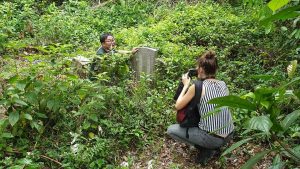
Katie Thornton (right) working on her audio project in a Singaporean cemetery on 清明節 (Qingming Jie, “Tomb-Sweeping Day”).
4. Be realistic.
Completing a project, like a podcast, can take time. Make a portion of your project (e.g. a few episodes or articles) before you commit to an ambitious publishing schedule. Take into account any logistical challenges you may encounter, including: faulty internet connections, weather conditions, your schedule, etc.
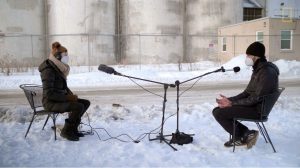
Katie Thornton (left) completes an interview while observing social distancing protocols.
5. Give people a reason to care, seek feedback, and put it out there!
There are very, very few pieces of media that appeal to a target audience of “anyone and everyone.” Think about who your work is for, and why you hope it will resonate with them. If you’re sharing stories or opinions that don’t come from personal experience, be sure to involve, listen to, learn from, and get feedback from people directly involved.
In general, seek lots of feedback. You may be surprised at just how many people–even strangers–are willing to listen/read your work and offer feedback! Allow people to give both general feedback and ask them specific questions about your work.
And then, start sharing! Use tools where you already have a presence–in community groups, via social media, etc. Good luck, and have fun!
Are you an educator looking for ways to use storytelling in your classroom or are you looking for more training to help you with audio storytelling? Click here to view the “Storytelling for Impact in your Classroom: Audio” course, a self-paced, free, online, video-based course designed by Katie in partnership with the National Geographic Society.
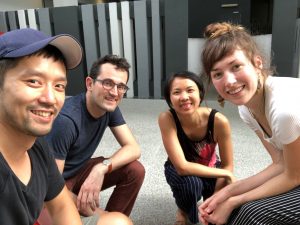
Katie Thornton (right) working in the field.


